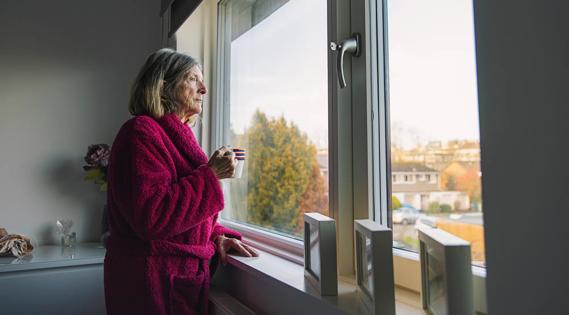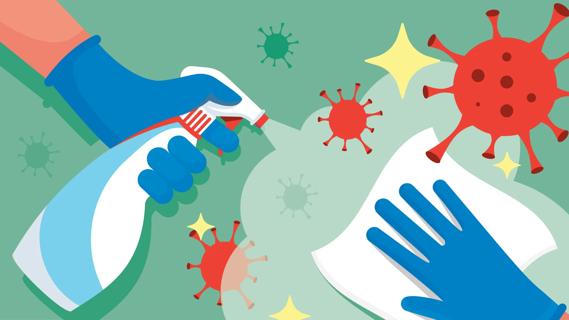Advertisement
It's all about small goals and riding the emotional wave

As more corners of the country begin to slowly re-open following the spread of COVID-19 (coronavirus), it’s not just schools and businesses that are slowly adapting to changes and a new routines.
Advertisement
Cleveland Clinic is a non-profit academic medical center. Advertising on our site helps support our mission. We do not endorse non-Cleveland Clinic products or services. Policy
Everyone is adjusting their day-to-day lives, be it something resembling their pre-outbreak schedule or a brand new one as we adapt to a post-coronavirus world. For many, it’s a challenging shift as there’s no real precedent. But just because the transition can be jarring, it doesn’t have to be a disaster.
One of the most important parts of adjusting to a new routine, says clinical psychologist Adam Borland, PsyD, is to accept that this is new for everyone. “It’s important to recognize there’s no blueprint for this,” he says. “We have to monitor the ‘should’-type thinking because it sets expectations.”
There’s also likely to be frustration attached to what Dr. Borland calls a “yo-yo dynamic,” in which people have finally adjusted to life during a pandemic and now they’re changing again. Because of this, Dr. Borland notes that it’s important to maintain a daily routine.
“So much of this is out of our control that if we create a daily routine, including small goals that we can see through to completion, that gives us a real sense of accomplishment for the day,” he says.
Even if you set those daily goals, it’s completely understandable that you’ll still feel frustration as you try to adapt to your new routine. And Dr. Borland says that dealing with that frustration comes down to communication.
Advertisement
“It’s very easy to internalize what we’re going through, especially the feelings of isolation and loneliness,” he says.
“When we communicate with others, like friends and family members, it’s beneficial because we recognize we’re not alone, that others are experiencing the same feelings. There’s a sense of camaraderie.”
That applies to the work environment, too. Open lines of communication between leaders in a business and other people within the department are important, Dr. Borland stresses. As leadership tries to figure out what works from both a business and personnel standpoint, he says, “People want to feel like they can talk to their managers without fear of ramification.”
It can be difficult balancing the logistics of a new routine alongside the emotions that come with, well, everything we’ve experienced in the last few months, both on a small, personal scale and a larger, global scale.
Says Dr. Borland, “We have to remind ourselves we’re doing the best we can. It’s important we prioritize emotional well-being, taking care of ourselves without a sense of guilt. That’s particularly important for parents who are trying to manage the ins and outs of homeschooling, trying to work and find some semblance of balance.”
It’s also important, he says, to remember to be fair to yourself even if some days feel like a setback. “A patient might think, ‘Okay, I’ll have three good days where I feel productive and I feel that I’m able to accept the new normal.’ But then they’ll feel like things are falling off a cliff. They’ll wake up wondering ‘What’s going on?’ and their anxiety about their health and the health of their loved ones will be through the roof.”
He elaborates, “It’s really about riding the emotional wave and acknowledging that today may be a difficult day. How can you take care of yourself? How can you communicate with loved ones and maintain that sense of connection? On the days that are easier, you just go with it and say, ‘It’s a good day and I’m going to try my best to enjoy it.’”
As restrictions are rolled back, there is a sense of optimism about the near future even as fears about a resurgence of illnesses remain. Dr. Borland recommends prioritizing emotional presence, “focusing on the what is versus what happened in the past or might happen in the future.”
He acknowledges focusing on the now is challenging but holding on to a sense of optimism can go a long way even if so much of the future remains speculative. “People have concerns about whether or not life will return to normal immediately or if they’ll have time to readapt. And there’s fear of what the new normal might look like.”
Advertisement
“My hope,” Dr. Borland says, “is that we allow things to unfold gradually and that we’re given time and understanding to adjust to the new normal.”
Advertisement
Learn more about our editorial process.
Advertisement

Studies have shown promising results, but additional research is needed

Infection and inflammation can cause you to lose your voice and have other voice changes until you’re fully healed

A COVID-19 infection can bring on depression or anxiety months after physical symptoms go away

Just like the flu, COVID-19 continues to evolve every year with new and smarter variants

The latest omicron subvariants carry specific mutations that may allow the SARS-CoV-2 virus to be better at evading immune protection

You can work out with mild COVID-19, but not in a gym, and listen to your body and don’t overdo it

Most people can return to work and regular life when they’re symptom-free for 24 hours

Lysol Disinfecting Wipes are just one of more than 500 products approved by the EPA for protection against the SARS-CoV-2 virus that causes COVID-19

If you’re feeling short of breath, sleep can be tough — propping yourself up or sleeping on your side may help

If you fear the unknown or find yourself needing reassurance often, you may identify with this attachment style

If you’re looking to boost your gut health, it’s better to get fiber from whole foods